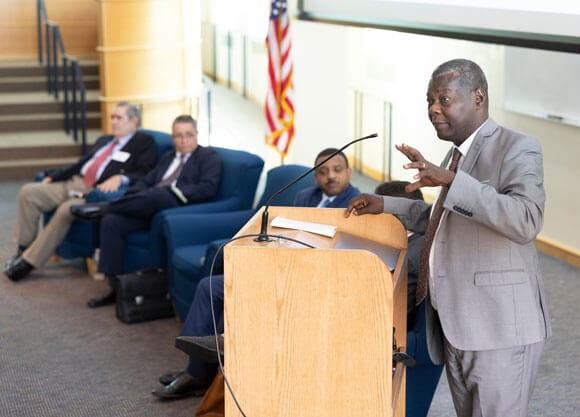
Cuban UN ambassador helps students discover the paths to progress
September 12, 2022

September 12, 2022

In a wide-ranging address entitled, “The Winds of Change,” Ambassador Pedroso Cuesta discussed many of the inflection points that have alternately strained and improved relations between the two countries since the Kennedy administration first imposed a trade embargo on Cuba under Fidel Castro’s Communist rule.
Sixty years later, through sanctions brought against the embattled island nation by American presidents from both ends of the political spectrum, the Cuban citizens’ struggle for sovereignty has been heightened, Pedroso Cuesta said.
There was diplomatic progress during the Obama administration, but instances of “financial persecution” as well as a return to the United States’ list of state sponsors of terrorism by the Trump administration “cynically strengthened” the embargo in recent years, he said.
Still, there is renewed hope for reconciliation, but it will require the former Cold War adversaries to actively pursue common ground.
“There are many things that unite us and many things that can benefit both sides,” said Pedroso Cuesta, who has served in his current role with the UN since October 2020. “Cuba is more than willing to sit down and open a dialogue.”
The ambassador said he was proud to represent a country whose accomplishments belie its stature. With a population of about 11 million, Cuba is one of the only countries from outside the ranks of the superpowers to develop its own COVID-19 vaccines, a testament to its newfound commitment to science and technology.
However, Cuba did suffer from depleted resources amid the pandemic, and the United States’ embargo complicated efforts to combat those issues. The ambassador lamented those limitations and others, such as the restrictions on internet access that stymie Cuban college students.
A softening of these sanctions, Pedroso Cuesta said, could help the Cuban people continue to reap the benefits of their independence.
“We are a country on the move,” he said. “The mainstream media doesn’t always portray us that way or seems only interested in portraying what’s happening with those in power… The question is, how can these people progress and flourish without access to the closest market?”
Pedroso Cuesta was introduced by the Executive Director of the Albert Schweitzer Institute and Professor of Political Science Sean Duffy. Associate Dean of Faculty Affairs and Professor of Management Poonam Arora opened the assembly with a few remarks, noting the parallels between U.S.-Cuba relations and the School of Business as well as why “winds of change” was an apt subject matter to explore.
“We tend to ride those winds as an institution and certainly in the School of Business,” said Arora. “We’ve often been on the cutting edge through our microlending programs and through our various study abroad endeavors. What we seek to do is create collective common good that is truly global in its scope.”
The ambassador was accompanied by Ambassador Yuri A Gala Lopez, the deputy permanent representative of Cuba to the UN; Minister Counsellor Roberto Hernández de Alba Fuentes, the former consul of Cuba in Cancun, Mexico; and Ernesto Sierra, the second secretary of the Cuban Mission to the UN.
Near the end of the Q&A portion of the event, Pedroso Cuesta proposed an educational delegation that Quinnipiac teachers and students could visit the island to see the progress and potential for themselves.
Quinnipiac Today is your source for what's happening throughout #BobcatNation. Sign up for our weekly email newsletter to be among the first to know about news, events and members of our Bobcat family who are making a positive difference in our world.
Sign Up Now